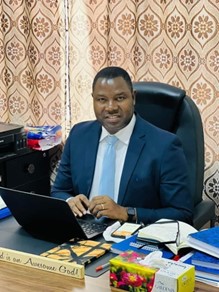The political landscape in Liberia is currently marked by tension as the ruling Unity Party distances itself from the ongoing campaign within the House of Representatives to oust opposition Speaker Jonathan Fonati Koffa of the Congress for Democratic Change (CDC). Unity Party Chairman Rev. Luther Tarpeh has publicly criticized this campaign, asserting that the CDC is in a state of political disarray. Tarpeh’s remarks come in response to CDC Chairman Janga Kowo’s claims that the Unity Party is behind efforts to remove Koffa, which Tarpeh dismisses as unfounded and absurd. He emphasizes that the CDC appears to be unable to recognize the procedural independence of the legislature, pointing out that nearly all of its lawmakers are part of the majority bloc. This highlights the internal divisions and challenges faced by the opposition party as they grapple with their own factional disputes.
Kowo’s allegations against the Unity Party suggest a narrative that the ruling party is meddling in legislative affairs. In an interview, he accused the Unity Party of financially incentivizing lawmakers to support Koffa’s removal, which he considers a breach of party trust, particularly since Koffa is affiliated with the CDC. Kowo indicates that punitive measures may be forthcoming for CDC officials who support Koffa’s ouster, insinuating that this behavior causes deep divisions within the ranks of the party, thus placing the party’s cohesion and future at risk. In response, Tarpeh has stressed that any decision regarding Koffa’s position ultimately lies with the CDC’s own members, as they were the original supporters of Koffa’s election as Speaker.
Adding to the political tensions, Deputy Speaker Thomas P. Fallah, also affiliated with the CDC, finds himself at a crossroads. He has requested additional time to consult with legal counsel before responding to an invitation from the majority bloc to discuss the Speaker’s removal. This request underscores the gravity of the situation, as any decision taken could have significant constitutional implications. The majority bloc—that consists of 43 members—has already initiated moves to push for Koffa’s removal, citing accusations of corruption and ineffective leadership as reasons for their actions, further exacerbating the instability within the House of Representatives.
As tensions mount, the calls for Koffa’s removal from a faction within the legislature reflect deeper issues of trust and accountability within the CDC. Despite the claims of corruption against Koffa, many insiders may question the motives behind the removal attempt, potentially viewing it as a factional power struggle rather than a genuine concern for governance. It raises significant questions about the integrity of the legislative process in Liberia, as political allegiances shift and members attempt to navigate their responsibilities amidst allegations and counterclaims. The gravity of the accusations against Koffa indicates that the CDC may need to confront significant challenges in defining its leadership and ensuring unity within its ranks moving forward.
The situation highlights the complexities of the current political climate in Liberia, where the opposition is struggling not only against a ruling party but also internally amongst its members. As Kowo endeavors to rally support and resolve dissent within the CDC, the response from the Unity Party portrays a focus on legitimacy and governance. Tarpeh’s remarks indicate a desire to maintain a non-interference approach while pressing for stability and collaboration within the legislature. This illustrates the need for productive dialogue and constructive resolution of conflicts within the political sphere in Liberia.
Ultimately, this ongoing political saga emphasizes the dynamic and sometimes precarious nature of legislative governance in Liberia. As the Unity Party maintains its distance from the allegations, the CDC is left to address its internal challenges while dealing with external pressures for accountability and effective leadership. The resolution of these issues will likely have significant implications for Liberia’s political future, shaping the operational landscape within the legislature and the broader engagement of Liberian citizens with their government. The developments may serve as a crucial learning point for all political parties on the necessity of maintaining cohesion and trust, both among party members and in their dealings with the citizenry.














